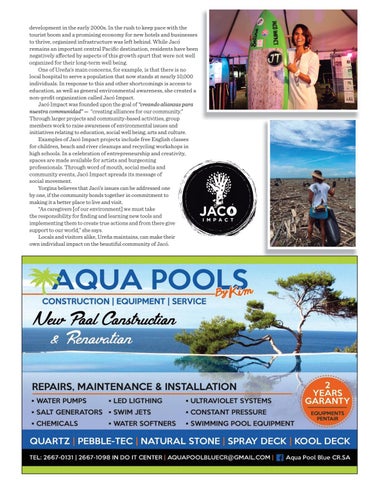development in the early 2000s. In the rush to keep pace with the tourist boom and a promising economy for new hotels and businesses to thrive, organized infrastructure was left behind. While Jacó remains an important central Pacific destination, residents have been negatively affected by aspects of this growth spurt that were not well organized for their long-term well being. One of Ureña’s main concerns, for example, is that there is no local hospital to serve a population that now stands at nearly 10,000 individuals. In response to this and other shortcomings is access to education, as well as general environmental awareness, she created a non-profit organization called Jacó Impact. Jacó Impact was founded upon the goal of “creando alianzas para nuestra communidad” — “creating alliances for our community.” Through larger projects and community-based activities, group members work to raise awareness of environmental issues and initiatives relating to education, social well being, arts and culture. Examples of Jacó Impact projects include free English classes for children, beach and river cleanups and recycling workshops in high schools. In a celebration of entrepreneurship and creativity, spaces are made available for artists and burgeoning professionals. Through word of mouth, social media and community events, Jacó Impact spreads its message of social movement. Yorgina believes that Jacó’s issues can be addressed one by one, if the community bonds together in commitment to making it a better place to live and visit. “As caregivers [of our environment] we must take the responsibility for finding and learning new tools and implementing them to create true actions and from there give support to our world,” she says. Locals and visitors alike, Ureña maintains, can make their own individual impact on the beautiful community of Jacó.
HM HOWLER MAGAZINE | 19
